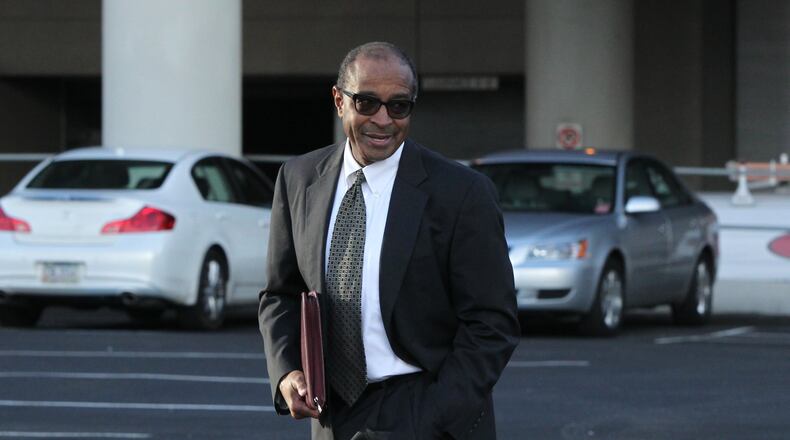Elvin "E.R." Mitchell Jr. already has a plea deal with federal prosecutors in the Atlanta City Hall bribery scandal. But Mitchell's lawyer this week asked a judge to seal the contractor's ongoing divorce case, stating that information disclosed in the family matter could be used against his client in the federal case or expose Mitchell to other criminal charges.
Odis Williams, Mitchell’s attorney asked Judge Constance Russell for a protective order that would seal upcoming briefs and records that would normally be presented to the court as part of the discovery process. Those documents are usually available for the public to see in a typical divorce case.
Williams indicated in his motion that his client’s divorce is anything but usual.
“In this matter, this divorce is associated with one of the most infamous public scandals in the history of Atlanta,” Williams wrote in the motion filed Tuesday in Fulton County Superior Court.
Mitchell was the first of two contractors to plead guilty to conspiring to pay more than $1 million in bribes to win city of Atlanta contracts. In February, not long after Mitchell's guilty plea, his wife filed for divorce. Marjorie Mitchell cited her husband's criminal conviction among the reasons to end their 28-year marriage.
Williams wrote that the divorce “has already garnered tremendous media attention,” and that “the disclosure of documents, items, and information otherwise normally provided in a divorce proceeding could expose both parties to further criminal culpability and consequences.”
Williams is asking to seal all documents, briefs, depositions and transcripts and to prohibit all parties and lawyers from disclosing information filed in the case “to any third party.”
Williams cited the Fifth Amendment to the U.S. Constitution, stating in his motion that the parties in the case “shall not be compelled to be a witness against themselves in any criminal case.”
Reached Friday, Williams said his motion should not be perceived to be an indication that Mitchell has been anything less than truthful and forthcoming to federal prosecutors. Williams said he made the motion “out of an abundance of caution,” describing the filing as “an ounce of prevention.”
“For the protection of both parties, this has been somewhat of a public spectacle for obvious reasons,” Williams said. “My client has not been sentenced yet, and anything he says can and will be used against him.”
As to his assertion that the motion is necessary to protect Marjorie Mitchell, Williams said: “I have no information on any culpability of Mrs. Mitchell.”
Marjorie Mitchell, through her attorney Esther Panitch, has previously denied any involvement in the bribery scheme. The couple has been separated for months, and Panitch has said her client has been “horrified by what’s been happening.”
“Given that Mr. Williams never had any evidence that Mrs. Mitchell participated in any criminal wrongdoing by his client, I was surprised he would take a contrary position in his motions,” Panitch said Friday. “To the extent Mr. Williams wants to look out for my client’s best interests, that’s my job.”
The Atlanta Journal-Constitution previously reported that Marjorie Mitchell’s name was used as the point of contact for at least two companies that filed with the city for status as a minority- or female-owned contractor, including one that got millions of dollars in city work during the time of the bribery scheme.
Panitch has said her client had no role in either of the companies, that Marjorie Mitchell’s name was used without her knowledge and that any construction business done in her name was done without her consent.
E.R. Mitchell is scheduled to be sentenced on April 28. He faces up to five years in prison, three years of supervised release, restitution and fines.
As part of his plea, Mitchell agreed to cooperate with the government and testify, and the U.S. Attorney’s Office in Atlanta agreed not to bring additional criminal charges against Mitchell related to the case.
But if the government determines Mitchell hasn’t been truthful, Mitchell could be vulnerable to prosecution for “perjury, false statements, obstruction of justice, and any other appropriate charge,” according to Mitchell’s plea agreement. Any information Mitchell provided to the feds as part of his plea deal in the bribery case could be used against him, the agreement states.
That plea agreement does not protect Mitchell from prosecution by other federal, state and local jurisdictions, according to court records.
Mitchell also faces another risk: People he testifies against could use information from the divorce to impugn his character in a trial.
About the Author
The Latest
Featured



